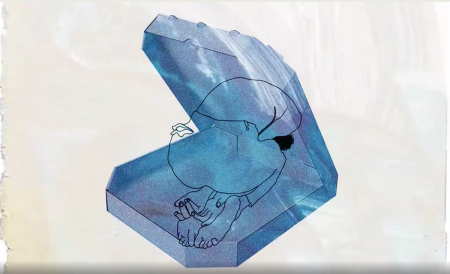Our first two sessions were games and getting to know each other. In the first session, when we sat down for reflections after playing a lot of games, one girl in the group, no older than 18, said the session reminded her of her childhood. We asked what she meant by that. She explained that now that they are jawan, literally translating to ‘young’, she felt she was listening about her past. This suggested that their childhood was over. Being jawan meant no more playing games, increased restrictions and external control over one’s body. There was no consensus on the age at which one turns jawan. One participant, a mother, said her family voices discomfort over her nine-year-old daughter playing freely on the streets. As facilitators, these discussions made us realise we need to plan a session around mobility.
On the day of the next session, we reached the centre to find that only four girls had showed up. There were four adults, the facilitators. We wondered how this would affect workshop dynamics as we started our activities. First, we all walked around the room at different paces, responding to instructions of the facilitator and learning to pay attention. Once we were comfortable with the space, we started an embodied walking exercise.
Here, participants are asked to walk around the space imagining they were somewhere else. First, we were in green fields, then in a city, in the rains, on the metro, in an all-women’s space, and finally, in a space with men and women. The girls had to walk without interacting with each other and in silence, which they did, until the facilitator asked them to walk as if they’re walking in the basti (neighbourhood) with men and women around. One girl in the group instantly embodied a boy and started ‘teasing’ (chhedna) the other girls in the group. Everyone burst into laughter and took turns to tease each other, all having a blast.
The game ended and we sat for reflections. The chhedna was the first thing we had to address!
One facilitator asked, “You people seemed to really enjoy teasing each other here…but when men do this to you girls on the street, then you don’t like it, or do you?”
They thought about it and one of the girls said,
“Actually, if guys talk to us on the street with respect, we don’t really mind it.”
The facilitator followed up. “So, have any of you experienced this?”
To our surprise, the girls shared stories of flirtations. The girl who went first talked about when she was younger and was visiting her village. A boy there had grown fond of her. To a group of giggling girls, she narrated how, for days, he would just come and hang out at her family’s house, and how one day, in the middle of the street, he had held her hand. This was a big deal. Ultimately, the two became friends. Fast forward to present day, the boy has now moved into her house in the city and has found a job as a labourer, and they are to soon marry. It was an arrangement she seemed thrilled about.
Another girl had a similar story to share. When she was visiting her village, there was a boy who took a liking to her. They had never spoken, because that wasn’t acceptable to family and society. They stuck to exchanging glances. The day she was leaving, he followed a few steps behind her and her brother, all the way to the bus stop, and sat in the bus behind her. He only got off the bus when it was about to leave. The two of them didn’t get to speak. Later he asked her cousin for her phone number. She didn’t have a number to give him.
“Would you give your number if you had a phone?” we inquired.
She said yes. “I’d have liked to talk to him.”
She liked how special it made her feel that he had sat behind her in the bus till it left.
The stories continued, and while we had started the conversation hoping to hear stories of violation, what we were hearing were stories of flirtation. Both conversations were happening under the same tag of ‘chhedkhaani’.
The only married participant sat coyly in the corner and we wondered if she was feeling excluded. Instead, she said she wanted to share her story and rearranged herself in her place before she started.
“My mother wanted me to marry a boy who was her sister’s son.”
She explained that the two liked each other and it seemed to fit well, but her father was against the idea. Ultimately, she got married to someone else. The boy in question continued to visit her, kept asking her to leave the husband and marry him instead. Later, when he realised that it was no longer be an option, he also married someone else, but brought the new wife to meet her when they came back to the neighbourhood. This had left her feeling happy and reassured that he had honoured their relationship, even though they were both married to other people.
Through this conversation, baffled that the language we only use to speak of violation was being used to talk about pleasure, we kept bringing the question back to whether ‘chhedkhaani’ is something they like.
“Not in all contexts,” one girl shared. “There was a boy in the market who looked at me in a weird way and that scared me.”
Then another said,
“If a man like Salman Khan were to ‘chhedo’ me on the street, I would not mind at all.”
To this, yet another responded, “Don’t you know, ‘decent’ men like Salman Khan don’t tease on the streets.”
The conversation suggested that anxieties around talking to boys on the streets is less about the latter than it is about what family members would do if they found their daughter talking to boys. Word in the community spreads fast; the violence they will face at the hands of their fathers and brothers would be harsher than from the man on the street. The fears around flirtation are, in fact, fears of a patriarchal social machinery on its guard against girls’ transgressing the slightest boundaries.

The boys themselves, it seemed, were the least of their worries.
A narrative of danger around sexuality plays right into a broader patriarchal agenda of viewing women as vulnerable and in need of protection from ‘able-bodied men’.
In this vein, after recent state elections, one state in India saw the birth and rise of Anti-Romeo Squads. These squads are apparently meant to curb street harassment of women. Yet, in reality, they act as a kind of moral police where women, and men who are their friends, can be “kept in check”. The space for women to exercise their own desires, to occupy the streets as they want, and to be sexual in a particular way diminished, as did the possibilities of inter-caste, inter-religious coupling. Every year, on Valentine’s Day, squads like these occupy the streets trying to clear them of lovers who are ‘polluting’ Indian culture. A few years ago, they had threatened with marriage couples they found on the streets on Valentine’s Day.
How to frame the debate on sexuality, sex positivity and harassment in the women’s movement is one of the most pressing questions of our time.
How do we talk about the tricky relationship between pain and pleasure?
bell hooks, in an article called Penis Passion, was responding to this exact problem two decades ago. She identifies the gap in our own language around talking about sex, particularly the penis. She argues that the “penis is still primarily represented as a weapon, as an instrument of indelicate and painful penetration”. She quotes Naomi Wolf’s account of her and her friends’ sexual encounters in their girlhood, saying, “We were obsessed. Not so much with what penises…but rather with what they were—the improbability of them, the beautiful weirdness, the way they oddly rose of their own volition and oddly defied gravity, their unfathomable responsiveness.” However, hooks continued, “Female talk about fascination with the penis often stops at girlhood and teen reminiscences. Not because it ceased to marvel, but because the marvellous aspects of the penis lose their charm when linked with strategies of male domination.” The dilemma she found herself in the 1970s is similar to the one we face now. In her words, “Those of us who enjoy penis passion often find ourselves silenced by the assumption that mere naming of our pleasure is traitorous and supports the tyranny of patriarchy.”
The #MeToo movement and its ripples have finally created space for women to
talk about profoundly fraught and unpleasant sexual experiences. It has allowed a speaking of the painful experiences we have put up with, for various reasons; we did not want to jeopardise our careers, we wanted to open up opportunities for ourselves, we wanted to be with our partners and make relationships work, we did not want to feel that we are unable to satisfy the person we are with sexually, we did not know who to speak to, who would take us seriously, but perhaps, most of all, because we had not accepted to even ourselves, that we deserved better.
To come back to the conversation around flirtation on the streets in the experience of four young Delhi girls, we noticed how our own anxieties around sexuality, and narratives of the experience of pleasure and danger, influenced what we expected to hear.
We focused on avoiding violation than to look for pleasure.
Being able to recognise our own pleasure and desire is as effective a way to demand that we “deserve better”, as is resisting violation. It also became abundantly clear that our discourse lacked the language for pleasure, or really, the space for it. Ironically though, this plays exactly into the strengthening of the patriarchy we wish to fight. It reproduces the idea that the interaction with men, especially sexually, will always be laden with power dynamic, one in which they are in a position of power to hurt us beyond repair. It takes away our own agency in acknowledging that we may transact with sex for a variety of reasons and undermines all we may find pleasurable and desirable, about sex and everything that leads to it.
The conundrum ahead of us, then, is to have an open and continuous conversation around our ideas of sexual intimacies and transactions. One that creates space for all kinds of narratives—not only those of violation, but also of pleasure.
(Excerpt from Building Spaces and Conversations, an upcoming publication by Nirantar Trust documenting theatre and sexuality interventions with young people.)





